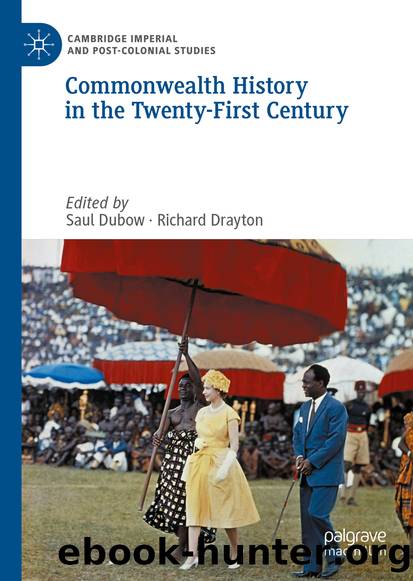Commonwealth History in the Twenty-First Century by Unknown

Author:Unknown
Language: eng
Format: epub
ISBN: 9783030417888
Publisher: Springer International Publishing
India, Britain and the Royal Visit
Parvathi Raman observes that the Royal Visit was the one occasion when the NIC failed to take the advice of Nehru who had counselled against a boycott of the Royal Visit in opposition to Gandhi.53 The ‘Nehru telegram’, in turn, was the cause of bitter conflict between the rival political groups. While the NIC quoted Gandhi’s approval of ‘abstention as a national and dignified step’, the ‘Moderates’ trumpeted the ‘Nehru telegram’ which advised against ‘overt demonstrations’ against the Royal Visit. While disclaiming any intention of dictating the actions of South African Indians, Nehru said that he opposed a boycott which could complicate the main issue on which the UN had declared in Indians’ favour.54 With plans for a boycott well advanced, the NIC initially responded by casting doubt on the very existence of this telegram and on the reliability of the word of the Moderates into whose hands the telegram fell. The Indian Opinion, edited by Manilal Gandhi, took the view that South Africans were better placed to make a judgement: ‘If we allow ourselves to be spoon-fed by leaders in India then we are fit for nothing’. Making an independent stand was a matter of self-respect and ‘national honour’ even if it meant going against revered Indian leaders.55 Manilal seems also to have taken umbrage over the suggestion that there could have been any alternative to non-participation consistent with national honour, and he bridled against the suggestion that a boycott equated to a lack of respect for ‘Their Majesties’.
As president of the Indian National Congress (INC) in 1937, Nehru had opposed the Coronation Durbar in India of the same king; by 1947, when he was the head of the transitional government and on the brink of power, his approach to another royal progress at a politically delicate moment was more pragmatic. His advice to the NIC was consistent with his announcement following the UN decision on South Africa that the Government of India would take no action while waiting for an initiative from the South African government. As Raman points out, his overriding concern was not to complicate a series of India-related negotiations at the UN—of which South Africa was one.56 He had the opportunity to talk directly to two of the most prominent South African advocates of boycotting the royals—Monty Naicker of the NIC and Yusuf Dadoo of the TIC—when they visited India between March and April to consolidate solidarity with India.57 For Nehru, as for Gandhi, the fate of South Africa’s Indians was inextricably bound up with the freedom struggle of India, and thus the controversies generated about the Royal Visit to the Union lent it political significance in their eyes. Their advice to the South Africans, however, differed. Whereas Gandhi had counselled restraint in 1939 in response to a projected passive resistance campaign against plans for segregation in the Transvaal, in 1947, he endorsed a boycott of the Royal Visit. Conversely, Nehru’s view was that the timing of a boycott was unpropitious in view of the hopes for a future Round Table between the two governments.
Download
This site does not store any files on its server. We only index and link to content provided by other sites. Please contact the content providers to delete copyright contents if any and email us, we'll remove relevant links or contents immediately.
Adulting by Kelly Williams Brown(4197)
Drawing Cutting Edge Anatomy by Christopher Hart(3256)
Figure Drawing for Artists by Steve Huston(3242)
Draw Your Day by Samantha Dion Baker(3086)
Drawing Shortcuts: Developing Quick Drawing Skills Using Today's Technology by Leggitt Jim(2910)
Make Comics Like the Pros by Greg Pak(2733)
Rapid Viz: A New Method for the Rapid Visualization of Ideas by Kurt Hanks & Larry Belliston(2700)
Draw to Win: A Crash Course on How to Lead, Sell, and Innovate With Your Visual Mind by Dan Roam(2618)
How The Mind Works by Steven Pinker(2593)
How Proust Can Change Your Life by Alain De Botton(2588)
0041152001443424520 .pdf by Unknown(2569)
Day by Elie Wiesel(2558)
Modern Cartooning by Christopher Hart(2476)
Draw-A-Saurus by James Silvani(2475)
Tattoo Art by Doralba Picerno(2466)
Poses for Artists Volume 2 - Standing Poses: An essential reference for figure drawing and the human form. (Inspiring Art and Artists) by Justin Martin(2417)
Learn Drawing Quickly by Sharon Finmark(2396)
Poses for Artists - Dynamic & Sitting: An essential reference for figure drawing and the human form (Inspiring Art and Artists Book 1) by Justin R Martin(2331)
Drawing and Painting Birds by Tim Wootton(2311)
